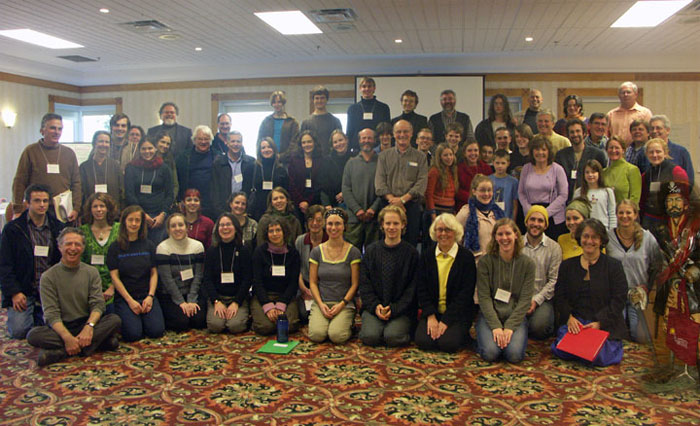
RETHINKING DEVELOPMENT
Outcomes & Follow-Up
The Oak Island Mini-Conference
Building Sustainable Development
Moving Atlantic Canada forward as a model of socially and environmentally responsible development.

|
The Second International Conference on Gross National Happiness RETHINKING DEVELOPMENT Outcomes & Follow-Up The Oak Island Mini-Conference |
||
| Nov. 18-19, 2005 |
Oak Island, Nova Scotia Building Sustainable Development Moving Atlantic Canada forward as a model of socially and environmentally responsible development. |
||
| April 21, 2006 | Workshop Report WORD | PDF | ||

|
|
Environment Canada PowerPoint “Show Me The Money” Detailed (2.1MB) “Show Me The Money” Summary (1.7MB) ACOA PowerPoint Sustainable Development in Atlantic Canada (324K) Natural Resources Canada PowerPoint Improving Energy Efficiency in Atlantic Canada (412K) Lynn Langille PowerPoint How to Write a Successful Proposal (52K) April 21, 2006 Workshop Report WORD | PDF |
An enthusiastic core group of participants at Oak Island Inn on Nova Scotia's south shore, after a second day of tackling issues of sustainability in Atlantic Canada.
On Friday, November 18 and Saturday, November 19, 2005, GPI Atlantic hosted a two-day workshop, BUILDING SUSTAINABLE DEVELOPMENT: Moving Atlantic Canada forward as a model of socially and environmentally responsible development. This workshop was a follow up to our recent Rethinking Development conference held in Antigonish in June 2005. We never intended the Antigonish conference to be just a one-time, feel-good event. The point of inviting 450 delegates from 33 countries and six continents here for that conference, including some of the world’s most brilliant practitioners of socially and environmentally responsible development, was always to turn our inspiration into action here in Atlantic Canada. Building on the partnerships and initiatives developed at the conference, the goal of this workshop was to begin to develop concrete and meaningful actions that will make genuinely sustainable development practices the norm rather than the exception in this region, and ultimately in the world. There is no reason that Atlantic Canada cannot become a laboratory from which others, both in Canada and abroad, can learn. We have all it takes to enhance prosperity in this region, strengthen community, and meet human and social needs while respecting our magnificent natural heritage. A wide range of participants from all four Atlantic provinces attended the workshop. Participants included government officials from federal, provincial, and municipal levels, representatives from a variety of non-governmental organizations, business people, academics, community leaders, and a strong contingent of young people. The workshop was a hands-on and very practical working session, rather than a formal event, and focused on developing tangible actions that will have a lasting effect. Presentations by ACOA, Environment Canada, and Natural Resources Canada highlighted some of the programs and initiatives that are available to help support and provide funding for projects with a focus on environmentally and socially responsible development. A presentation by Lynn Langille of the Atlantic Health Promotion Research Centre gave excellent guidelines and tips for writing a winning funding proposal. The rest of the workshop time was spent focusing on specific issues. Issues were raised in a brainstorming session with the whole group. All of the topics that were brought up were then organized into several central themes. The themes were discussed in smaller break out groups and included topics such as education, the political dimension, strengthening communities, engaging industry, and energy. The following are summary notes from these sessions made on-the-fly for Saturday afternoon’s concluding report back from groups. |
||
|
|
|||
Education
|
|||
|
|
|||
Political Dimension
Where are we now? What is the current state of politics?
Where do we want to go? Where to be in 10 years?
|
|||
|
|
|||
|
Community Strengthening
Engagement What is the process that brings community together?
|
|||
|
|
|||
Engaging Industry
“a good carrot and a good stick”Participants representing:
|
|||
|
|
|||
|
Energy
Ideas:
|
|||
|
|
|||
|
Participants are continuing to communicate with each other about ways of moving forwards. A follow up report is in the process of being written, and will be posted here when it is complete.
We extend our thanks to ACOA and Environment Canada for their generous support, which enabled us to offer subsidies to individuals, non-profit organizations, students, and youth. For more information about the workshop, to get involved, or to join the mailing list, please contact Clare Levin at GPI Atlantic by phone, 902-489-2524 or by email, clevin@gpiatlantic.org. |
|||
|
What they are saying about Rethinking Development
Overview :: Presenters :: Proceedings :: Papers :: Outcomes :: Home |
|||
|
Sealevel Photo courtesy Stella McNeil |
|||